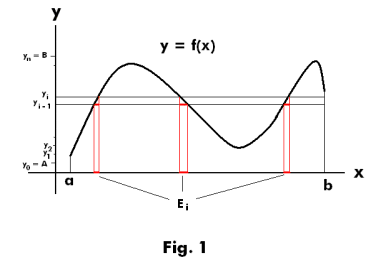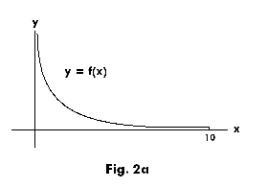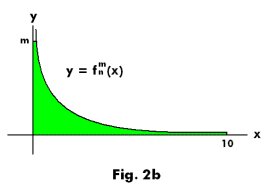
Website owner: James Miller
The Lebesgue integral. Theorems. Bounded, dominated, monotone convergence theorems.

Lebesgue integral. Let f(x) be a bounded measurable function defined over a (Lebesgue) measurable set E of finite measure (for intuitive insight view f(x) as the function y = f(x) shown in Fig. 1 defined on the interval [a, b] --- where E corresponds to the interval [a, b]). Choose two real numbers A and B such that the range of y = f(x) lies between A and B [A and B represent lower and upper bounds of f(x)]. Divide the interval of the y axis from A to B up into n subintervals by choosing points y0 = A, y1, y2, .... , yn = B as shown in Fig. 1. Let
![]()
i.e. Ei is the subset of E consisting of the set of x ε E for which
![]()
See Fig. 1.
An approximation to the Lebesgue integral of the function f(x) is the Lebesgue integral sum
1) S = y1 · mE1 + y2 · mE2 + .... + yi · mEi + ..... yn · mEn
where mEi is the measure of point set Ei. The Lebesgue integral
![]()
is the limit of the Lebesgue integral sum S when max |yi -1 - yi| → 0 and n → ∞.
Note. In place of 1) the sum
2) S = y0 · mE1 + y1 · mE2 + .... + yi -1 · mEi + ..... yn -1 · mEn
can also be used. Both give the same result.
Theorems on Lebesgue integrals of bounded functions
In the following we assume that all sets are measurable and of finite measure and that f(x) is bounded and measurable and thus Lebesgue integrable.
1. For any constant c
![]()
2. For any constant c
![]()
3. If E has measure zero, then
![]()
4. Mean-value theorem. If A
![]() f(x)
f(x)
![]() B, then
B, then
![]()
5. If E = E1 ∪ E2 where E1 and E2 are disjoint, then
![]()
6. If E = E1 ∪ E2 ∪ ... where E1, E2, ..... are mutually disjoint, then


8. If f(x) and g(x) are bounded and measurable on E, then f(x)g(x) is Lebesgue integrable on E i.e.
![]()
9. If f(x)
![]() g(x) on E, or almost everywhere on E, then
g(x) on E, or almost everywhere on E, then
![]()
10. If f(x) is bounded and measurable on E, then |f(x)| is Lebesgue integrable on E. Conversely, if |f(x)| is bounded and measurable on E, then f(x) is Lebesgue integrable on E.
11. If f(x) is bounded and measurable on E, then
![]()
12. If f(x) = g(x) almost everywhere on E, then
![]()
13. If f(x)
![]() 0 almost everywhere on E and
0 almost everywhere on E and
![]()
then f(x) = 0 almost everywhere on E.
The Lebesgue integral has one remarkable property that the Riemann integral does not have. It is the property given by the following theorem.
Bounded convergence theorem. Let {fn(x)} be a sequence of measurable functions defined on an interval [a, b] that converges almost everywhere to f(x). If these functions are uniformly bounded i.e. there exists a constant K such that
|fn(x)| < K
for every n and every x in [a, b], then
![]()
Bounded convergence theorem for infinite series. Let u1(x), u2(x), .... be measurable on [a, b] and the partial sums

be uniformly bounded on E (i.e. there exists a constant K such that |sn(x)| < K for every n and all x ε [a, b] ) and
![]()
Then

Relationship between Riemann and Lebesgue integrals. If f(x) is Riemann integrable in [a, b], then it is Lebesgue integrable in [a, b] and the two integrals are equal. The converse is, however, not true. If f(x) is Lebesgue integrable in [a, b], it need not be Riemann integrable in [a, b].
Theorem 1. A function is Riemann integrable in [a, b] if and only if the set of discontinuities of f(x) in [a, b] has measure zero i.e. if f(x) is continuous almost everywhere.
Theorem 2. If f(x) is continuous almost everywhere in [a, b], then it is Lebesgue integrable in [a, b].
*********************************************************************
Def. Lebesgue integral for unbounded functions. Let f(x) be an unbounded
measurable function defined over a measurable set E of finite measure. Define
![]() as
follows:
as
follows:

Then f(x) has the Lebesgue integral

![]()
provided this limit exists.
For intuitive insight see Fig. 2a and 2b for a function f(x) defined on the interval [0, 10].
If the set E does not have finite measure and
![]()

approaches a limit as the boundaries of an interval I all increase indefinitely, in any manner, then that limit is defined as
![]()
Theorems on Lebesgue integrals of bounded functions
In the following we assume that all sets and functions are measurable.
1. If f(x)
![]() 0, then
0, then
![]()
exists if and only if

is uniformly bounded.
2. If |f(x)|
![]() g(x) almost everywhere on E and g(x) is integrable on E, then f(x) is also
integrable on E and
g(x) almost everywhere on E and g(x) is integrable on E, then f(x) is also
integrable on E and
![]()
3. A function f(x) is integrable on E if and only if |f(x)| is integrable on E and in such case
![]()
Because of this we say that f(x) is integrable on E if and only if it is absolutely integrable on E.
4. If
![]()
exists, then f(x) is finite almost everywhere in E.
5. If E has measure zero, then
![]()
6. If

exists and if A is a measurable subset of E, then

also exists. In such case we have
![]()
7. Let E = E1 ∪ E2 ∪ ... where E1, E2, ..... are mutually disjoint. Then if
![]()
exists


9. For any constant c
![]()
10. If f(x) is integrable on E and g(x) is bounded, then f(x)g(x) is integrable on E.
11. If f(x) = g(x) almost everywhere on E, then
![]()
12. If f(x)
![]() 0 almost everywhere on E and
0 almost everywhere on E and
![]()
then f(x) = 0 almost everywhere on E.
13. If f(x) is integrable on E, then given ε > 0 there exist a δ > 0 and a set A
![]() E such that if mA
< δ
E such that if mA
< δ
![]()
14. Let f(x) be integrable in E. If {Ek}is a sequence of sets contained in E such that
![]() = 0,
then
= 0,
then
![]()
Source: Spiegel. Real Variables (Schaum)
Dominated convergence theorem. Let {fn(x)} be a sequence of measurable functions defined on an interval [a, b] that converges almost everywhere to f(x). Then if there exists a function M(x) integrable on E such that
|fn(x)|
![]() M(x)
M(x)
for every n, then
![]()
Dominated convergence theorem for infinite series. Let u1(x), u2(x), .... be measurable on [a, b]. Let there exist an integrable function M(x) on [a, b] such that |sn(x)| ≤ M(x) where sn(x) is the partial sum

and let
![]()
Then

Theorem. If for the series

the condition

holds for some constant M and if v(x) is bounded and measurable on [a, b], then

Fatou’s theorem. Let {fn(x)} be a sequence of non-negative measurable functions defined on [a, b] and suppose that the sequence converges to f(x) almost everywhere. Then
![]()
Monotone convergence theorem. Let {fn(x)} be a sequence of non-negative monotonic increasing functions defined on [a, b] and suppose that the sequence converges to f(x). Then
![]()
Theorem. Let uk(x)
![]() 0, k = 1, 2, .... . Then
0, k = 1, 2, .... . Then

provided either side converges.
References
James and James. Mathematics Dictionary
Spiegel. Real Variables (Schaum)
Mathematics, Its Content, Methods and Meaning.
Natanson. Theory of Functions of a Real Variable
Jesus Christ and His Teachings
Way of enlightenment, wisdom, and understanding
America, a corrupt, depraved, shameless country
On integrity and the lack of it
The test of a person's Christianity is what he is
Ninety five percent of the problems that most people have come from personal foolishness
Liberalism, socialism and the modern welfare state
The desire to harm, a motivation for conduct
On Self-sufficient Country Living, Homesteading
Topically Arranged Proverbs, Precepts, Quotations. Common Sayings. Poor Richard's Almanac.
Theory on the Formation of Character
People are like radio tuners --- they pick out and listen to one wavelength and ignore the rest
Cause of Character Traits --- According to Aristotle
We are what we eat --- living under the discipline of a diet
Avoiding problems and trouble in life
Role of habit in formation of character
Personal attributes of the true Christian
What determines a person's character?
Love of God and love of virtue are closely united
Intellectual disparities among people and the power in good habits
Tools of Satan. Tactics and Tricks used by the Devil.
The Natural Way -- The Unnatural Way
Wisdom, Reason and Virtue are closely related
Knowledge is one thing, wisdom is another
My views on Christianity in America
The most important thing in life is understanding
We are all examples --- for good or for bad
Television --- spiritual poison
The Prime Mover that decides "What We Are"
Where do our outlooks, attitudes and values come from?
Sin is serious business. The punishment for it is real. Hell is real.
Self-imposed discipline and regimentation
Achieving happiness in life --- a matter of the right strategies
Self-control, self-restraint, self-discipline basic to so much in life